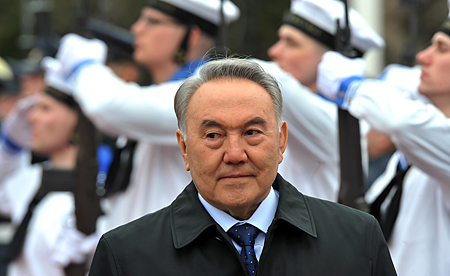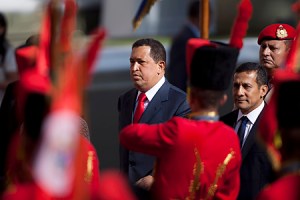
Kazakhstan's President Nursultan Nazarbayev reviewing a guard of honour during a visit in Tallinn, April 20, 2011. (Photo: Raigo Pajula - AFP - Getty Images)
Earlier this week, the German tabloid Bild published an exclusive: Nursultan Nazarbayev, President of Kazakhstan, was said to be in convalescence following surgery in a hospital in Hamburg. Without disclosing its sources, the tabloid claimed Nazarbayev underwent a procedure to his prostate — what likely could be treatment for cancer. News of the 71-year-old’s ill-health sparked a flurry of intrigue over the resource rich Central Asian state’s political future. Nazarbayev has ruled Kazakhstan for the entirety of its independent existence, and brooks little dissent. The Kazakh government simply said Nazarbayev was out of country “on short-term leave”; an official at the Kazakh embassy in Berlin told reporters that Nazarbayev “is on vacation, and he could be anywhere in the world.”
The mystery and rumors surrounding Nazarbayev’s illness mirrors a similar episode on the other side of the world. For the past few weeks, many have scratched their heads over the fate of Venezuelan President Hugo Chávez. The demagogic strongman is currently in Cuba for a second round of surgery on a pelvic condition some reports claim is cancer. In his absence, as we’ve reported, the jockeying for a post-Chavista Venezuela has already begun. And, as in Nazarbayev’s Kazakhstan, the effects of the uncertainty surrounding Chávez’s health has only brought into relief the extent to which politics in both countries are so overshadowed by the men in power.
Earlier this month, TIME and Global Spin’s Tim Padgett wrote of the impact of Chávez’s initial absence:
If Chávez’s recent absence reminded the western hemisphere of anything, it was that his socialist, anti-U.S. Bolivarian Revolution relies too much on Venezuela’s comandante and not enough on its Constitution. That was evident from the moment Chávez was rolled into a Havana operating room the night of June 10: For the next two weeks if not longer, Vice President Elías Jaua as well as the Chavista-dominated National Assembly and Supreme Court seemed paralyzed, reluctant to make a move or utter a word without Chávez’s approval, especially when it came to the question of whether the Constitution directed Jaua to assume temporary presidential powers while Chávez was twice under the knife. (Jaua refused to do so.)

Venezuela's President Hugo Chavez and Peruvian President-elect Ollanta Humala (R) inspect the honour guard during a welcome ceremony at the Miraflores Palace in Caracas July 15, 2011. (Photo: Carlos Garcia Rawlins - Reuters)
Now, speaking from Cuba, Chávez has confirmed that he intends to compete in 2012 polls and has made sunny statements about his health on Twitter — this despite some other reports that his condition is so severe that he could perish within 18 months. He has eschewed opposition calls to transfer his powers to Jaua and other members of his government, which, according to some reports, is already trying to neutralize or disqualify potential non-Chavista presidential candidates.
In Kazakhstan, Nazarbayev’s stranglehold on power is even tighter. His re-election earlier this year, won with more than 95% of the vote, was just short of a rubber-stamp. A rival presidential candidate even claimed to have chosen Nazarbayev on the ballot. Yet if rumors of his ill-health prove to have real substance, they may shake a country that’s long been one of the more stable states in Central Asia. Given Kazakhstan’s vast oil reserves, Nazarbayev’s authoritarianism would never trouble diplomats in Beijing and Moscow, and has also been long tolerated by the U.S.
Whatever cancers or maladies Chávez and Nazarbayev may have, the fact that these glimpses at their mortality are cloaked in such shadows and mystery illustrates the depth of the cults of personality built around them and the regimes they preserve. Both politicians pay lip service to democracy and its ideals, but a post-Chávez future for Venezuela remains impossible to divine — all the while, opposition groups spy a steady erosion of their rights. In Kazakhstan, succession would be a process deliberated by cronies, apparatchiks and son-in-laws (one very much in favor, another very much out). In either case, what lingers is a stunted politics that will forever be dwarfed by the autocrats at the top and the networks of patronage and influence they control. From one side of the world to the other, that’s the true cancer that needs to be defeated.

